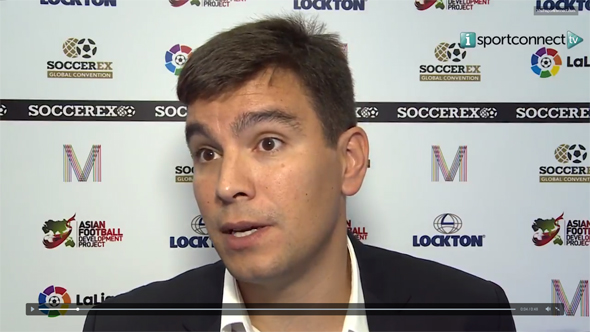EXCLUSIVE: Match fixing a key issue for UEFA
October 6, 2016
The head of UEFA’s disciplinary and integrity unit, Emilio García, has outlined how seriously the organisation is taking match fixing, calling it ‘a vital issue’.
García oversees all disciplinary matters at UEFA, calling himself ‘the ugly face of the company’, as his unit hands out suspensions and penalties to players and teams.
But while on the field misdemeanours usually get the most attention in the press, UEFA see their key integrity battle elsewhere: match fixing.
UEFA have a dual responsibility in this area: to protect the integrity of their competitions and their brand, but also as the governing body of European football, to investigate and punish domestic teams who are found to have manipulated the result of matches. García admitted it was no easy task:
“It’s a long process to see improvement. It’s not easy. We have been fighting match fixing for 10 years.They are difficult battles, but we are introducing new measures and a new legal framework. The results and the outcomes are getting there, so we are happy. But this a fight that never ends and you must continue. They are very challenging issues, but I think we are handling them well.”
The frustration within UEFA is when they have strong suspicions that a match has been fixed, due to irregular betting patterns, or other suspicious activity. However obtaining the necessary proof to bring the case to court is challenging, they are usually at the mercy of local authorities.

But a key breakthrough has emerged, a big victory for García and his team. For the first time ever, a club was banned for match fixing, with the only proof being irregular betting patterns. Crucially it was also upheld by CAS. García explains why it was such a significant result for UEFA:
“Match fixing is a key issue for us; it’s vital. A few months ago we referred a case to the Court of Arbitration for Sport (CAS). It’s the case of the Albanian club Skënderbeu.” said García. “It’s the first time that we referred this type of case, in which the evidence coming from the police and prosecutors was very limited, but we had a very strong argument from a betting perspective. It’s the first time we have referred a case to CAS, in which we banned a club from UEFA competitions based on betting patterns. CAS upheld our decision to exclude the club. This is something that we will in the future explore in depth. There are some clubs that are involved in match fixing, but sometimes it’s difficult to collaborate with local and international authorities. This is why this case is so important to us, by looking at the betting patterns, we can deduct and conclude that a club is fixing matches, and we can exclude them from UEFA competitions. With CAS’ approval, it is an approach we need to explore now and maybe expand on.
It raises the question of how many matches UEFA have found with suspicious betting patterns, but García was quick to explain, that thanks increased scrutiny, the number of games that under investigation were very small:
“We used to say that less than 1% of European matches have irregular betting patterns. Irregular betting patterns do not necessarily mean that the matches are being manipulated, but it is certainly a game we need to look at.” explained García.
“That’s a start. But then we need to go to the real match fixing cases. But even if one match is manipulated at domestic or international level, then we must act. Match fixing is vital for us. It is a challenging issues, that’s why we are taking it so seriously and investing a lot of time and money in this battle, working with national associations and Europol.
With the integrity of sport in the spotlight more than ever, UEFA will hope that their new powers in fighting match fixing will help Emilio García and his team make it virtually impossible to fix matches.



